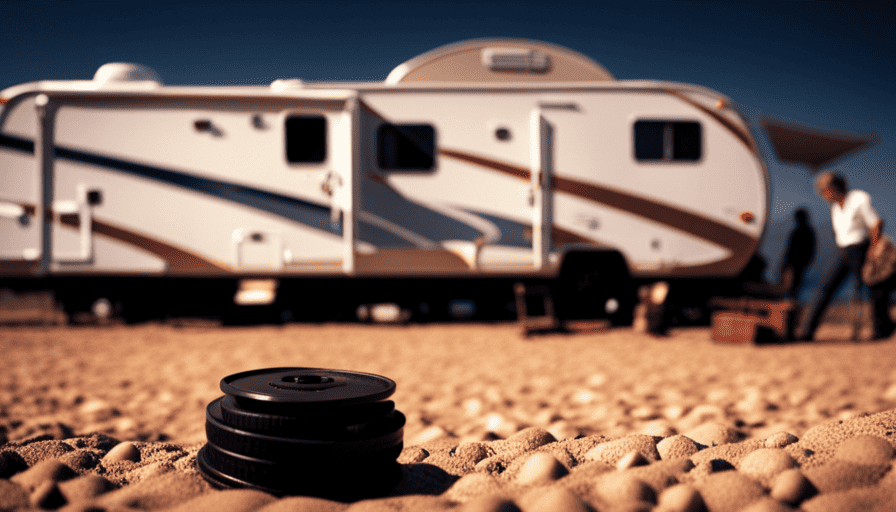Tired of dealing with mice invading your camper every winter? Trust me, I understand your frustration. It can be so irritating to cozy up for a nice evening in your camper, only to be interrupted by the sound of little mouse feet scurrying around.
But fear not, because I have the solution you’ve been searching for. In this article, I’m going to share with you some practical and effective tips on how to keep mice out of your camper during the winter months. From sealing entry points to using natural repellents, I’ve got you covered.
So, say goodbye to those unwanted guests and hello to a peaceful and mouse-free camper experience this winter. Let’s dive in and discover the secrets to keeping those furry intruders at bay!
Key Takeaways
- Identify and seal gaps or openings where mice can enter
- Use natural repellents like peppermint oil, vinegar, cloves, or dryer sheets
- Set traps in strategic locations to catch mice that have already entered
- Consider using ultrasonic devices as an alternative method
Seal Entry Points: Identify and seal any gaps or openings in your camper where mice can enter.
Don’t let those pesky mice invade your camper this winter – seal up any gaps and openings to keep them out! Winterizing your camper is essential to ensure a cozy and pest-free season. Here are some tips and tricks to prepare your camper for the winter months.
Firstly, thoroughly inspect your camper for any potential entry points. Mice can squeeze through even the tiniest gaps, so pay close attention to areas around pipes, vents, and windows. Use weatherstripping or caulk to seal these openings, preventing mice from finding their way inside. Additionally, consider installing door sweeps to block any gaps at the bottom of doors.
To further safeguard against pests, it’s important to address the issue of preventing other unwanted critters from entering your camper. Along with mice, spiders and insects can also become unwelcome guests during the winter. Applying insect repellent around your camper’s perimeter and sealing off any cracks or crevices will help keep these pests at bay.
By taking these proactive measures, you can create a strong defense against mice and other pests. With a sealed camper, you can enjoy a worry-free winter season, knowing that your cozy retreat is protected. Remember, the next step is to remove food sources – keep your camper clean and free of food crumbs or spills that may attract mice.
Remove Food Sources: Keep your camper clean and free of food crumbs or spills that may attract mice.
Make sure to clean up any food crumbs or spills in your camper to avoid creating an enticing environment for unwanted visitors. Keeping your camper clean and free of food sources is an essential step in preventing mice from taking up residence during the winter months. Here are some cleaning tips and preventive measures to help you keep those pesky critters away:
- Wipe down countertops and tables with a disinfectant cleaner to remove any food residue.nn2. Sweep the floors regularly to eliminate crumbs and food particles that may have fallen.nn3. Store all food in airtight containers to prevent mice from accessing it.nn4. Dispose of garbage promptly and securely, preferably in a sealed container outside of the camper.
By following these cleaning tips and preventive measures, you can significantly reduce the chances of mice finding your camper attractive. However, if you want to take an extra step to deter them, you can use peppermint oil. Mice dislike the smell of peppermint, so placing cotton balls soaked in peppermint oil around your camper can help keep them away.
Use Peppermint Oil: Mice dislike the smell of peppermint, so placing cotton balls soaked in peppermint oil around your camper can deter them.
Enhance your camper’s defense against unwanted visitors by infusing the air with the invigorating scent of peppermint oil using cotton balls strategically placed throughout. Not only does peppermint oil provide a refreshing aroma, but it also acts as a natural mouse repellent. Mice dislike the strong smell of peppermint, making it an effective deterrent for keeping them out of your camper during the winter months.
To maximize the effectiveness of peppermint oil, create a DIY peppermint oil solution by soaking cotton balls in the oil and placing them in various locations inside your camper. The smell will permeate the air, making it an unpleasant environment for mice. Additionally, consider exploring alternative mouse repellents such as essential oils like eucalyptus or lavender, as mice are known to dislike these scents as well.
In order to fully protect your camper from mice, it’s important to combine the use of peppermint oil with other DIY mouse proofing techniques. Seal any cracks or openings in your camper with steel wool or caulk to prevent mice from entering. Keep your camper clean and free of food crumbs or spills that may attract mice. By implementing these strategies, you can create an inhospitable environment for mice and ensure they stay away from your camper.
Transitioning into the subsequent section about setting traps, remember that prevention is key, but it’s also important to be prepared. In the event that mice have already entered your camper, it’s crucial to set traps in strategic locations to catch them.
Set Traps: Place mouse traps in strategic locations inside your camper to catch any mice that may have already entered.
Once you’ve taken the necessary precautions to protect your camper, it’s time to strategically set traps and catch any unwanted guests that may have already found their way inside. Here are some mouse proofing techniques and natural mouse deterrents to help you keep your camper rodent-free:
-
Snap traps: These classic traps are effective and easy to set up. Place them in areas where you suspect mouse activity, such as near food sources or along walls.
-
Glue traps: Sticky glue traps can be placed in corners and tight spaces where mice may try to hide. Once they step on the trap, they become stuck and can be easily disposed of.
-
Live traps: If you prefer to catch mice without harming them, live traps are a humane option. Once you catch a mouse, release it far away from your camper.
-
Electronic traps: These traps use batteries to deliver a high-voltage shock to mice, instantly killing them. They are quick and efficient.
By using these traps strategically, you can catch any mice that may have already entered your camper. This will ensure that your space remains mouse-free throughout the winter.
Now, let’s move on to the next section about using ultrasonic devices to further deter mice without chemicals.
Use Ultrasonic Devices: Ultrasonic devices emit high-frequency sounds that are unpleasant for mice and can help keep them away.
To further protect your camper from unwanted guests, you can use ultrasonic devices, which emit high-frequency sounds that mice find unpleasant and will deter them from entering your space. Ultrasonic devices have been proven to be effective in keeping mice away, making them a great alternative to traps.
Imagine you’re camping in the mountains and you decide to try out an ultrasonic device in your camper. The device emits a constant high-frequency sound that effectively keeps mice away, allowing you to enjoy your camping trip without any pesky visitors.
One of the main advantages of using ultrasonic devices is that they’re non-toxic and safe to use around humans and pets. Unlike traditional mouse traps, which can be dangerous and require constant monitoring, ultrasonic devices provide a hassle-free solution for keeping mice out of your camper. Additionally, these devices cover a larger area compared to traps, ensuring that every corner of your camper is protected.
While ultrasonic devices are effective, it’s important to note that they’re not the only solution. To further enhance their effectiveness, it’s recommended to combine their use with other mouse deterrents, such as sealing all possible entry points and keeping your camper clean and clutter-free. By creating an unwelcoming environment for mice, you can greatly reduce the chances of them entering your camper.
To ensure the best results, it’s important to follow the manufacturer’s instructions when using ultrasonic devices. Additionally, regularly check the devices to ensure they’re functioning properly and replace them if necessary. By incorporating ultrasonic devices into your mouse prevention strategy, you can have a worry-free camping experience.
When it comes to keeping mice out of your camper, using ultrasonic devices is just one step. Another important measure to take is to store food properly. Keep all food items tightly sealed in airtight containers to prevent mice from being attracted to them.
Store Food Properly: Keep all food items tightly sealed in airtight containers to prevent mice from being attracted to them.
Make sure you tightly seal all your food items in airtight containers to prevent those pesky mice from being attracted to them. Taking preventive measures is crucial when it comes to keeping mice out of your camper during the winter months. By storing your food properly, you can avoid providing an open invitation to these unwanted visitors.
To help you maintain a mouse-free environment, consider using the following repellent options:
| Repellent Options | Description | Effectiveness |
|---|---|---|
| Peppermint Oil | The strong scent of peppermint is known to deter mice. Simply soak cotton balls in peppermint oil and place them strategically around your camper. | Moderate |
| Mothballs | While primarily used for repelling moths, mothballs can also be effective in keeping mice away. Place them in areas where mice are likely to enter, such as near doors and windows. | High |
| Fabric Softener Sheets | Mice dislike the strong smell of fabric softener sheets. Place them in cabinets, drawers, and other areas where food is stored. | Low |
By incorporating these preventive measures and repellent options, you can significantly reduce the chances of mice infesting your camper. However, it is also important to regularly check and remove any potential nesting materials, such as paper or fabric, that mice may use. This will further discourage them from making your camper their winter home.
Remove Nesting Materials: Regularly check and remove any potential nesting materials, such as paper or fabric, that mice may use.
Regularly checking and removing any potential nesting materials, like paper or fabric, is critical in ensuring those pesky little rodents don’t turn your camper into their cozy winter retreat. Preventive measures are key in rodent proofing your camper and keeping mice out during the winter months. Here are some practical rodent proofing techniques to follow:
-
Seal any gaps or cracks: Mice can squeeze through tiny openings, so make sure to inspect your camper thoroughly and seal any gaps or cracks with steel wool or caulk.
-
Install door sweeps: Fit door sweeps to the bottom of your camper doors to prevent mice from sneaking in.
-
Use wire mesh: Cover vents, pipes, and other openings with wire mesh to block mouse entry points.
By taking these preventive measures, you can greatly reduce the chances of mice making a home in your camper over the winter. Additionally, using natural repellents such as vinegar, cloves, or dryer sheets can act as effective deterrents. These substances emit scents that mice find unpleasant, helping to keep them away from your camper. With these tips in mind, you can enjoy a mouse-free winter camping season.
Now, let’s explore the next section about using natural repellents to further deter mice.
Use Natural Repellents: Certain natural substances like vinegar, cloves, or dryer sheets can act as repellents and deter mice.
To ensure a mouse-free camper during the winter, it is essential to take proactive measures. We have already discussed the importance of removing potential nesting materials, but there are other effective methods to consider as well. One such option is utilizing natural repellents, which can act as deterrents for mice.
Natural substances like vinegar, cloves, and dryer sheets have been known to repel mice due to their strong smells. These substances can be strategically placed in and around your camper to discourage mice from entering. However, it is important to consider the pros and cons of using natural repellents. While they are eco-friendly and safe for humans and pets, their effectiveness may vary. Some mice may be deterred by these scents, while others may not be affected at all.
In addition to natural repellents, there are alternative methods for deterring mice in your camper. This could include using ultrasonic devices that emit high-frequency sounds that mice find unpleasant. Another option is using peppermint oil, as mice are repelled by its strong scent. It is important to research and experiment with different methods to find the one that works best for your specific situation.
By incorporating these natural repellents and alternative methods, you can significantly reduce the chances of mice entering your camper during the winter. However, it is important to remember that prevention is key. In the next section, we will discuss how keeping the surrounding area clean can further discourage mice from approaching your camper.
Keep the Surrounding Area Clean: Trim vegetation and remove debris around your camper to eliminate hiding spots and discourage mice from approaching.
Ensure a mouse-free environment by clearing away vegetation and removing debris from the area surrounding your camper, discouraging mice from approaching.
As winter approaches, it’s important to trim any overgrown vegetation that may provide hiding spots for mice. Shrubs, grass, and tree branches should be neatly trimmed to eliminate potential entry points for these pesky creatures.
Additionally, removing any debris such as fallen leaves, woodpiles, or clutter around the camper will further discourage mice from venturing near.
To effectively keep mice out of your camper, it’s crucial to seal any potential entry points. Inspect the exterior of your camper thoroughly and identify any gaps or holes that mice could use to gain access. Use wire mesh or steel wool to fill these openings, as mice can’t chew through these materials. Pay close attention to areas around pipes, vents, and windows, as these are common entry points for mice.
Consulting a professional pest control service may be necessary if you’re dealing with a severe mouse infestation. They have the expertise and knowledge to assess the situation and provide effective and long-lasting solutions.
Remember, a proactive approach to maintaining a mouse-free environment around your camper is key to enjoying a worry-free winter season.
Consult a Professional: If you’re dealing with a severe mouse infestation, it may be best to seek professional pest control services to ensure effective and long-lasting results
To effectively keep mice out of your camper over the winter, it’s important to take a multi-faceted approach. As mentioned in the previous subtopic, keeping the surrounding area clean is crucial in deterring mice. However, in severe mouse infestations, it may be necessary to consult a professional pest control service for a more comprehensive solution.
Consulting a professional pest control company has numerous benefits. Firstly, they have the expertise and experience to identify the extent of the infestation and implement appropriate measures. They can also provide long-lasting results, ensuring that your camper remains mouse-free throughout the winter. Additionally, professional services often offer guarantees, giving you peace of mind that the problem will be properly addressed.
When choosing a professional pest control company, there are several factors to consider. Firstly, ensure that the company is licensed and insured, as this demonstrates their credibility and professionalism. Look for companies that specialize in rodent control, as they will have specific knowledge and strategies for dealing with mice. It’s also important to inquire about the methods they use, ensuring they are effective yet safe for your camper and the environment.
While there are steps you can take on your own to keep mice out of your camper, consulting a professional pest control service is essential in severe infestations. The benefits of hiring professionals and the factors to consider when choosing a company will help ensure effective and long-lasting results. So don’t hesitate to seek professional help for a mouse-free winter in your camper.
Frequently Asked Questions
How do I identify potential entry points for mice in my camper?
To identify potential entry points for mice in my camper, I first visually inspect the exterior for any gaps or holes. I pay close attention to areas around pipes, vents, and windows, as they’re common entry points. I also check for chew marks or droppings as signs of mouse activity.
Once identified, I seal these entry points using steel wool or silicone caulk. It’s crucial to address these openings promptly to prevent any unwanted furry guests.
Are there any specific types of food that are more likely to attract mice?
There are specific food types that are more likely to attract mice. Mice are drawn to foods that are high in sugar, such as cereals, grains, and chocolate. Additionally, they are attracted to foods with strong odors, like peanut butter and cheese.
To prevent mice from being attracted to these foods, it’s important to store them in airtight containers and clean up any spills or crumbs immediately. Using these prevention methods can help keep mice away from your camper.
Can I use a combination of different natural repellents to increase their effectiveness?
Yes, combining different natural repellents can be an effective way to keep mice out. By using a variety of repellents, you increase the chances of deterring mice from entering your camper. For example, peppermint oil, steel wool, and mothballs can all be used together to create a strong barrier against mice. Each repellent works in a different way, making it harder for mice to adapt and find a way in.
How often should I check and remove potential nesting materials from my camper?
I check and remove potential nesting materials from my camper at least once a week to prevent mice infestation. It’s important to maintain a regular checking frequency to ensure that there aren’t suitable places for mice to build their nests. I make sure to securely dispose of any materials in sealed bags or containers, away from my camper, to minimize the chances of mice returning.
What are the signs of a severe mouse infestation that would require professional pest control services?
If you’re wondering when to call for professional pest control services for a severe mouse infestation, look for these signs.
Excessive droppings, gnawed wires or furniture, and strong musty odors are red flags.
If you’ve tried mouse infestation prevention methods and DIY control techniques without success, it’s time to seek professional help. They have the expertise and tools to effectively eliminate the infestation and prevent further damage to your camper.
Conclusion
After implementing these preventive measures, I thought I had successfully kept the mice out of my camper for the winter. But little did I know, they were still lurking in the shadows, waiting for the perfect moment to strike.
As the temperature dropped and the snow fell, I thought I was safe. But one fateful night, I heard the telltale scratching and scurrying sound. They had found a way in. Don’t let this happen to you.
Stay vigilant, seal those entry points, remove food sources, and use all the tools at your disposal to keep those pesky mice away from your cozy camper.










